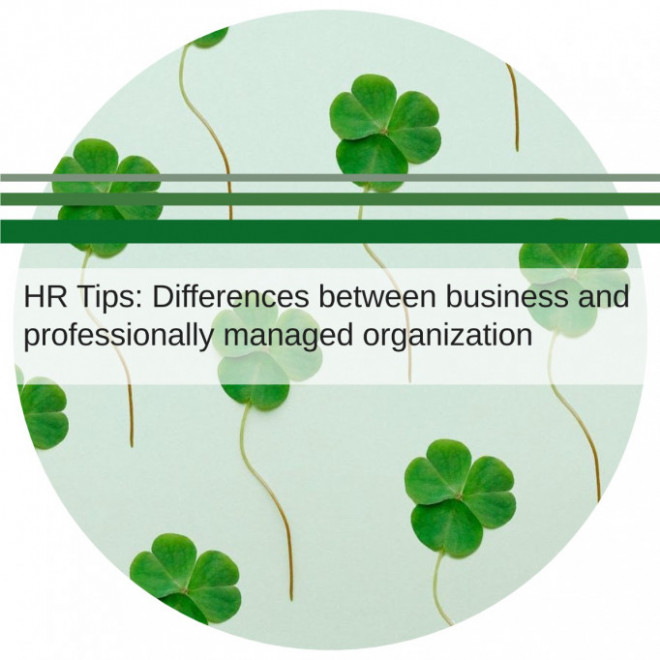If your company is small, you may not worry too much about operating systems, management systems, or even organizational culture, because in a group of two, three, or five people these are not a challenge. These are normal interpersonal relationships, very simple solutions that work, so you don't have to worry about the various challenges that corporations face. However, if your company grows every day, you should be aware of how a small company differs, how the entrepreneur's approach differs from that of a more complex organization.
The matter of profit
Consider profits - from an entrepreneur's point of view, profit is something that comes up when selling. Small entrepreneurs very often do not pay attention directly to profit, but rather to sales - they assume that if sales increase, profit also increases. This is not always true, because when we develop, our profits are usually detached from sales. If at the beginning we assumed a certain margin level, then over time it turns out that this margin shrinks because there are additional costs that were not there at the beginning. On the other hand, professionally managed organizations take profit as an absolute priority, they start from profit, focus on profit, and profit is more important to them than a sale.
Planning
The second key area of the company's activity is planning. Small entrepreneurs, people running a business either do not plan at all or if they do, they do it in a very informal way. This means that any plans are usually only in the owner's head, and even if he sometimes shares some elements of his plan with employees, it is very informal and employees do not necessarily know if it is a loose idea or is it some kind of plan. a strategic guideline for the company's future. In more formal organizations, planning is also formalized, and it's an ongoing process that includes strategic plans - where we're going and organizational plans - how it's all going to be covered. In the case of such a complex organization, all plans are written down, you can come back to them, you can refer to them, not only can you, but compare what we have planned with what we are implementing.
Organization
Another key element of the company's operations is organization. Small entrepreneurs usually do not have a problem with it, because if the company is me or me and one, two or three more people, I do not need any organizational chart. Not only that, it's great if all these people can exchange because when one person gets sick, I don't have any full-time job to replace this one person, I don't keep anyone like that just in case, it would be quite absurd, just the role of absurd people are taken over by someone from the team, so flexibility is important - these roles often overlap, complement each other, and are interchangeable. Completely different than in the case of large organizations. There, everyone knows what their tasks are, what they are responsible for, what they do, so there is no such interchangeability and that's good, because if there were interchangeability, it would simply be chaos, so it has to be different.
In a large organization, everyone knows what their tasks are, what they are responsible for, what they do.
Control
The next element of the company's activity is controlled. With small businesses, control appears in one form or another, but it is random, has no formal form, it is just that when an entrepreneur notices that something is wrong, he notices it. If I hear about a friend of mine has a problem in some area of the company's activity, maybe I will also look at that area in my company, but there are no people who are responsible for control other than the entrepreneur himself, who does it from time to time. time because he has other things on his mind. In the case of professionally managed companies, control is one of the key elements of management, it is built into the organization, so there are people for that, there are procedures for that, and it all happens in a formalized, continuous and orderly manner. Every employee knows, for example, how often periodic appraisals take place, how the appraisal takes place, what the rewards are, what the penalties are - all these elements are clear from the very beginning. There is something like a managerial development program in professional organizations, we can pick out and develop such talents that are suitable for managerial positions, we can hire people from outside the company, this program is planned, orderly. In the case of a small company, there is no such thing, because it is difficult to obtain such a program if we have a team of three - everything here is based on observing how people work, if we notice that someone excels in his work and perhaps shows some talents for organizing work others, this is probably a good candidate for a future managerial position.
Budgeting
There are several other areas of the company's activity that differ drastically in small businesses and large, more complex, and professionally managed companies. Budgeting is such an area. I do not think that many small companies have formal budgets and that these budgets also assume various variants: pessimistic, medium, optimistic - in large companies, this is the order of the day.
Innovation and risk-taking
When it comes to innovation and risk-taking in small companies, a lot depends on the owner's willingness to take risks and his attitude to change, in large organizations we have it planned and the risk is properly calculated.
Leadership
When it comes to leadership, it's the same - we have a single entrepreneur and his personality, or we have different management styles, but it's not like one manager runs the whole company, these styles are spread over many different people who are on different levels in the company's organizational structure.
Organizational culture
More complex and professionalized organizations sometimes have it written down and organized, and in small companies, it is very informal.
Conclusion
To sum up, implementing an application for managing employee development in an organization brings many benefits: process optimization, time savings, full access to HR processes at all levels of the structure, automatic reports, and process monitoring. It is also has a lot of challenges and work. Do you still have doubts? Start working with Brainy HR that can provide everything you need to build your employer brand.


 Posted on Aug 14, 2020 by Anna
Posted on Aug 14, 2020 by Anna


